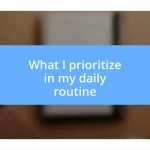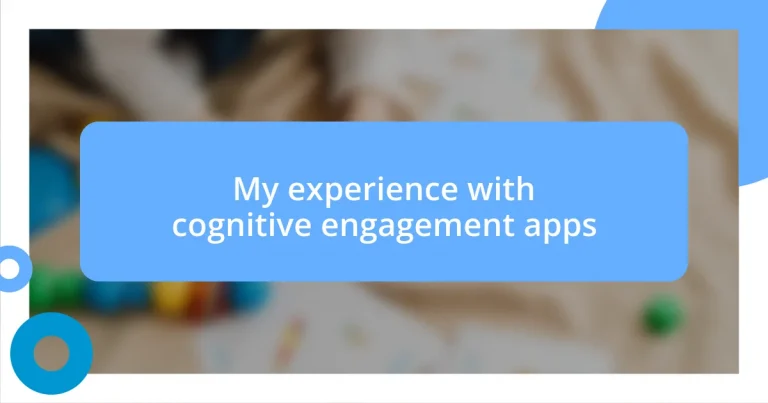Key takeaways:
- Cognitive engagement apps enhance mental capabilities through gamification, improving problem-solving skills, focus, and mood.
- Popular apps like Lumosity, Elevate, and Peak offer diverse cognitive challenges tailored to user needs, providing a fun learning experience.
- Consistency, variety in activities, and social engagement with friends enhance the effectiveness of these apps and motivate users to achieve their cognitive goals.
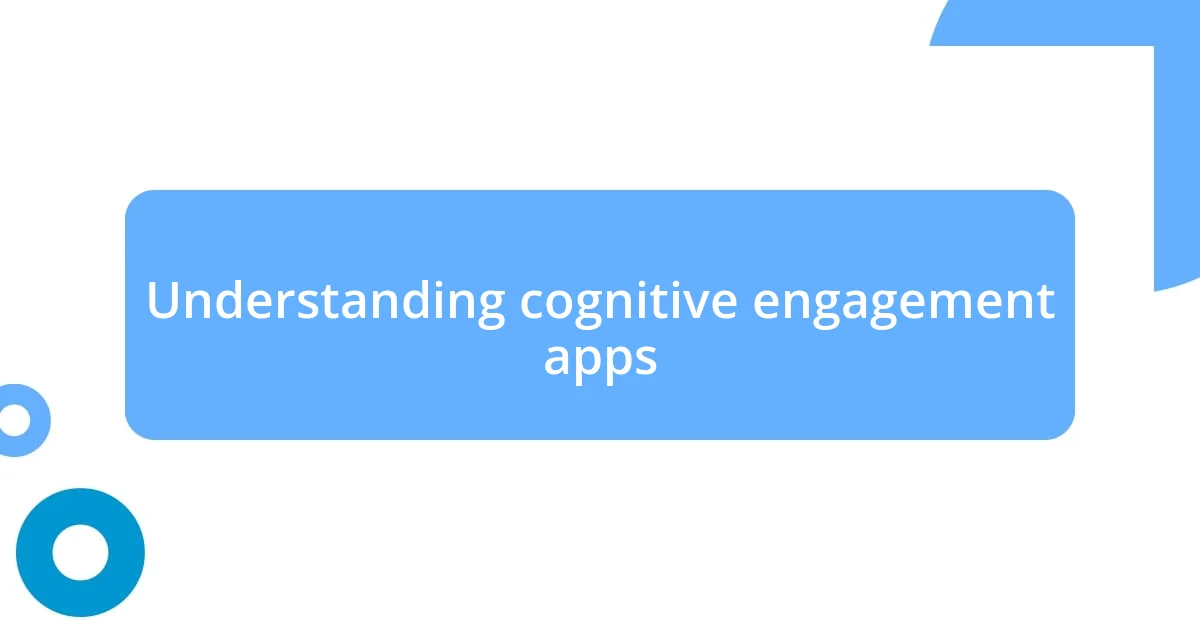
Understanding cognitive engagement apps
Cognitive engagement apps are designed to stimulate mental activity, enhancing our thinking and learning capabilities. I remember the first time I used one; it felt like unlocking a door to a hidden world of puzzles and brain games. I found myself wondering: could something so simple actually make a difference in how I think?
These apps often utilize gamification, which means they incorporate game-like elements to engage users more effectively. Personally, I noticed that while I played these games, my focus sharpened and my mood lifted, almost like a fun workout for my brain. It raises an interesting question: does enjoyable engagement lead to better cognitive outcomes?
Moreover, cognitive engagement apps come in various forms, from memory exercises to problem-solving challenges. Once, I got caught up in a challenging logic puzzle that had me thinking for hours. In moments like these, I realized how these apps not only entertain but also nurture critical thinking skills that are vital in everyday life. Wouldn’t it be great if we could combine fun with learning in more aspects of our day?
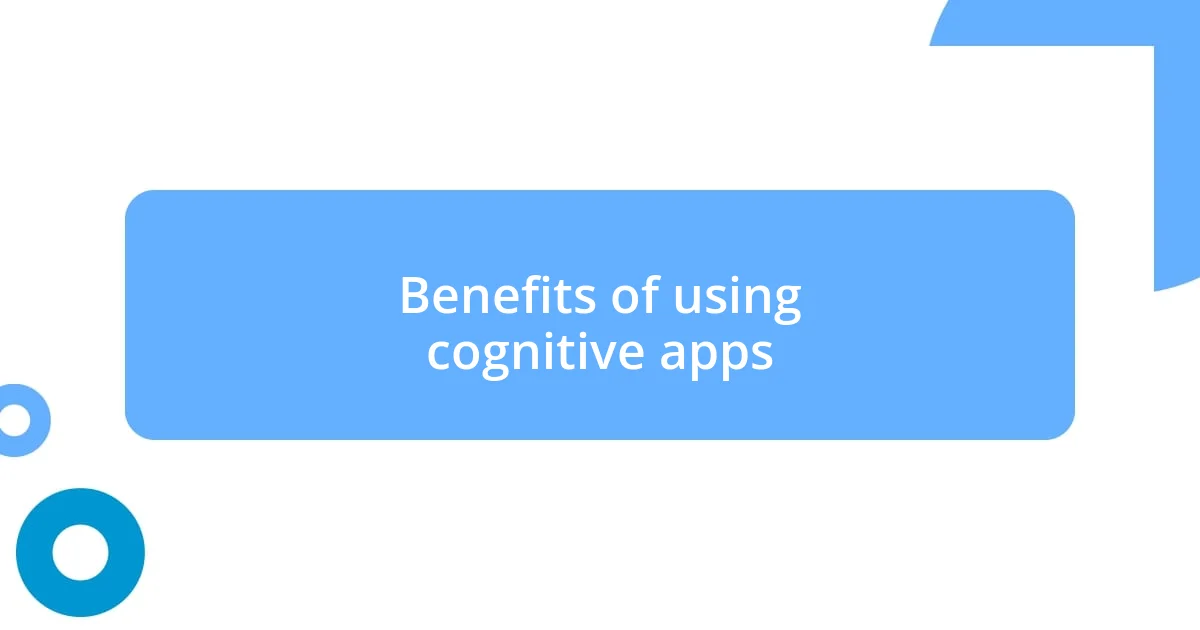
Benefits of using cognitive apps
Using cognitive engagement apps has significantly enriched my mental capacity in ways I hadn’t anticipated. One benefit I’ve experienced firsthand is the enhancement of my problem-solving skills. I remember spending an entire afternoon immersed in a game that required strategic thinking, and afterward, I felt a sense of accomplishment that carried over into my daily life. It’s remarkable how a simple app can sharpen our ability to tackle real-world problems.
The advantages of these apps extend beyond just entertainment; they promote cognitive health in several vital ways:
- Increased Focus: I’ve often found myself more attentive and less distracted during tasks after using these apps regularly.
- Memory Enhancement: Engaging with memory exercises really challenged me, and I now recall information more swiftly than before.
- Mood Improvement: There were days when I felt a bit down, but diving into a brain game lifted my spirits.
- Social Interaction: Many apps offer challenging multiplayer options, fostering a sense of community and engagement with friends.
All these elements combine to create a positive impact on not only cognitive abilities but also emotional well-being, making these apps an integral part of my daily routine.
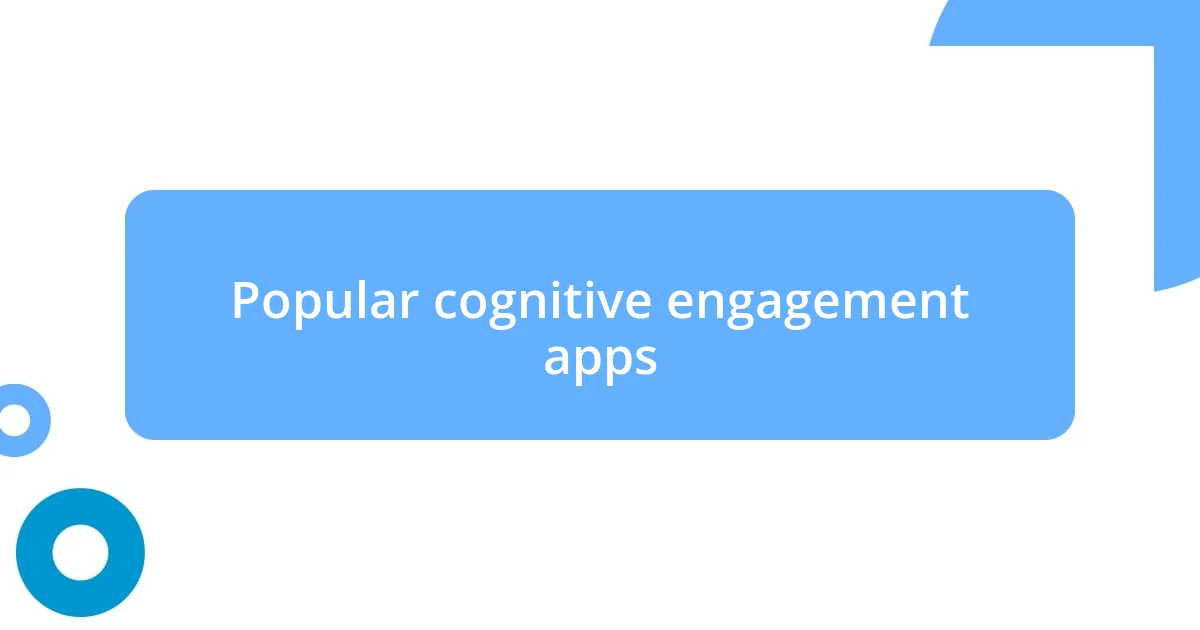
Popular cognitive engagement apps
Cognitive engagement apps have gained popularity for their ability to transform mental workouts into enjoyable experiences. For instance, I often turn to “Lumosity,” which offers a personalized training program that adjusts to my progress. It feels like having a personal coach tailored to sharpen my brain! On the other hand, “Elevate” focuses more on real-life skills, such as writing and math, allowing me to improve my communication while having fun. I remember the glow of satisfaction after acing a writing challenge, as it felt directly relevant to my daily tasks.
Another app that has captured my attention is “Peak.” It offers an extensive library of games covering various cognitive skills. One day, I was caught up in a memory game, recalling sequences that initially seemed impossible. I never thought of myself as someone with a particularly strong memory, but that session gave me a newfound confidence in my cognitive abilities. Each level completed felt like a small victory.
In the realm of cognitive engagement, the experience can vary significantly based on what you’re seeking. Here’s a look at how some popular apps compare in their features and focus:
| App Name | Focus Area |
|---|---|
| Lumosity | Customized brain training |
| Elevate | Real-life skills enhancement |
| Peak | Diverse cognitive challenges |
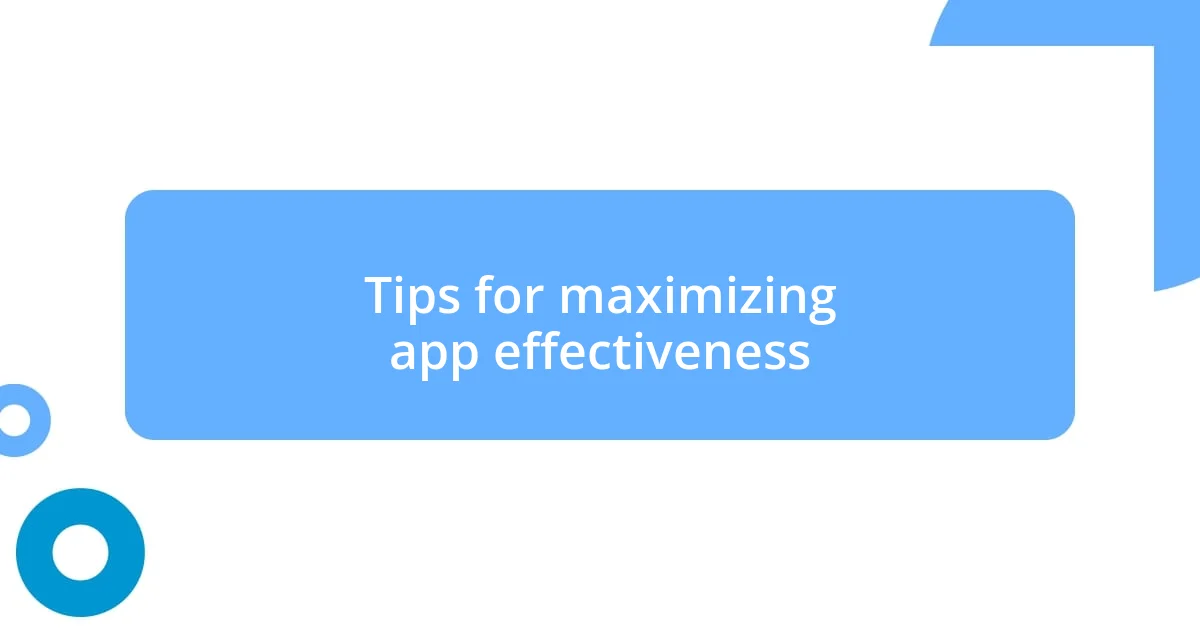
Tips for maximizing app effectiveness
To truly make the most of cognitive engagement apps, consistency is key. I’ve noticed that setting aside a specific time each day to engage with these apps has not only improved my skills but also created a satisfying routine. Have you ever found that by making something a daily practice, it begins to feel less like work and more like a rewarding habit?
Another tip I suggest is to actively vary the types of activities you engage with. While I enjoy mastering memory games one week, I might dive into problem-solving puzzles the next. This variety not only keeps things fresh but also engages different cognitive areas, creating a holistic workout for my brain. Have you considered how exploring diverse challenges can push you beyond your limits?
Lastly, don’t hesitate to leverage the social features some apps offer. I remember inviting a couple of friends to join a multiplayer game through “Peak.” The friendly competition sparked laughter and sparked deeper connections while pushing us all to improve. So, why not make it a fun challenge and invite others along for the journey? Engaging socially can amplify the benefits tenfold!
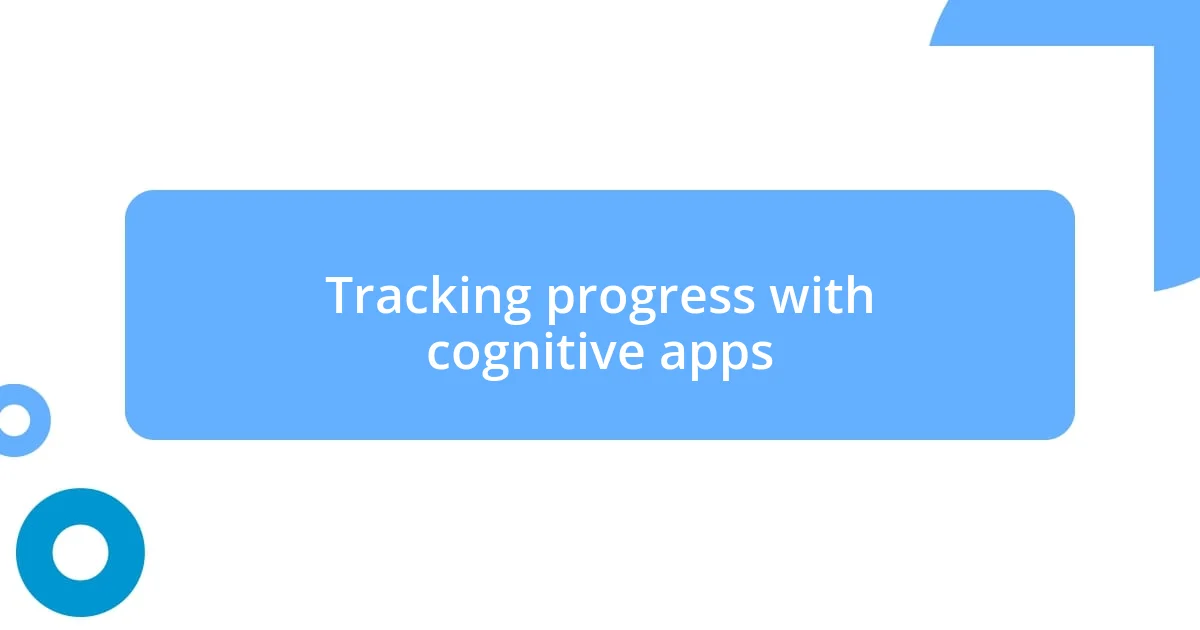
Tracking progress with cognitive apps
Tracking progress in cognitive engagement apps is one of the most motivating aspects of using them. I remember the excitement when I earned my first “skill badge” on Lumosity. It felt like a tangible reward for my effort, and I could see how my performance improved over time. Have you ever experienced that rush of pride when you conquer a challenging level? That feeling makes the journey rewarding.
One feature I find incredibly valuable is the progress tracking graphs that many apps provide. For instance, Elevate displays my performance trends over weeks, allowing me to spot areas where I’ve excelled or might need more focus. I often find myself reflecting on these trends—are they showing consistent improvement? Which skill am I neglecting? This awareness encourages me to adjust my practice, creating a dynamic learning experience that keeps me engaged.
Interestingly, some apps even allow you to set personal goals. I once decided to improve my writing skills and set a target to complete a specific number of tasks each week. The sense of accountability that came from tracking my progress gave me a stronger commitment. Have you ever set a goal that pushed you beyond what you thought possible? The blend of self-generated challenge and the app’s metrics created a powerful motivator for my cognitive growth.
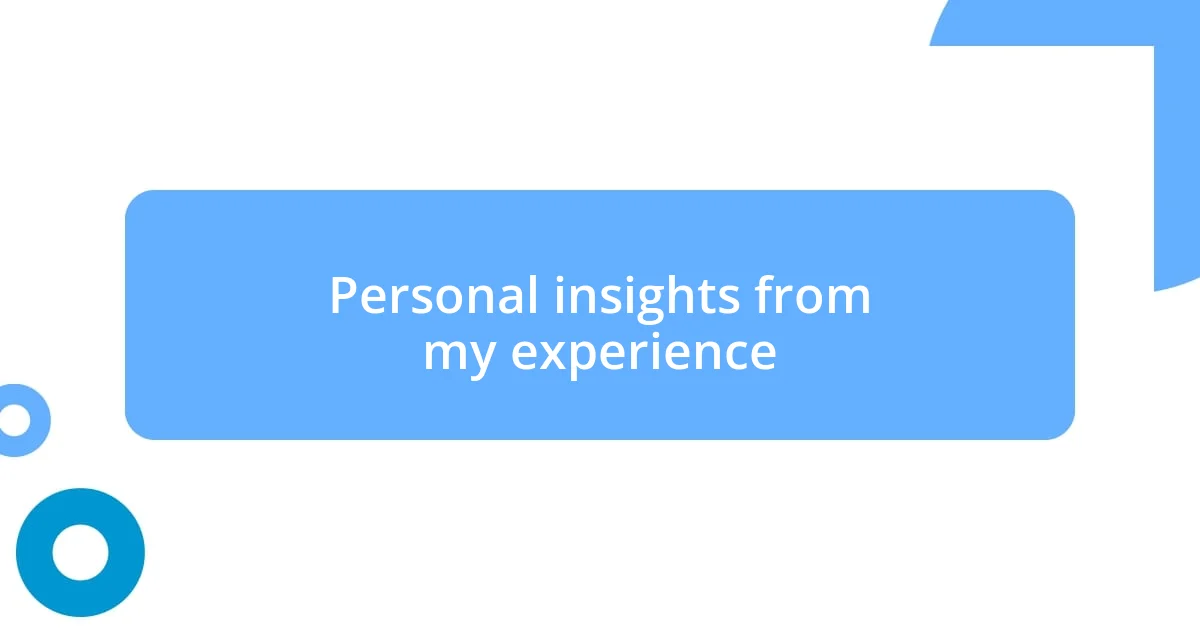
Personal insights from my experience
Engaging with cognitive apps has truly shaped my daily life in unexpected ways. I remember one rainy afternoon when I found myself deeply engrossed in a brain-teaser game. The hours flew by, and I actually felt a rush of endorphins as I gradually cracked each puzzle. Does time even matter when you’re having so much fun while challenging your brain?
There’s something about the feedback from these apps that I find absolutely empowering. On particularly stressful days, seeing my progress chart spike up after a solid session feels like a personal victory. I recall feeling a wave of relief and joy when I managed to level up on a particularly tough skill. Have you ever had that moment when you surprise yourself with a newfound ability?
I truly appreciate the community aspect of some cognitive engagement apps. Once, after a long week, my friends and I decided to join a group challenge on an app. The camaraderie and collective spirit transformed our individual struggles into shared goals. Isn’t it incredible how a little friendly competition can turn a mundane activity into an exhilarating experience?

